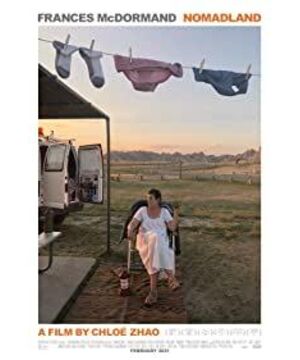I actually don't fully understand Fern, I didn't love someone so hard, and I didn't remember so hard, but at the end of the film, I feel that my soul has been seized. It's like fern stops again and again, Departure, encounter, and departure, there must be farewells in life. Farewells come with pain.
But this film is not depicting the pain of parting and the ordeal of life, it is trying to convey another form of farewell-going on the road and experiencing it.
So, although I still don't fully identify with the homeless people in the film, I am full of respect.
Zhao Ting uses countless montages to connect the experiences of Fern. It's hard to say that during the journey, she healed others, or the accompanying travelers healed her. I would think, it's more about inner strength.
After her husband dies with Empyle's demise, the throbbing fire in Fern goes out (like several other homeless people in the film). But I still sensed that she had a strong heart—as she named her RV—vanguard.
So when I saw the old man who admired Fern and tried to keep him, I knew that Fern would leave.
This peace of mind is my hometown, and Fern's peace of mind is precisely in the journey of encountering, cuddling, and saying goodbye to individuals who have the same soul defect, carefully guarding that most precious memory, and slowly reconciling with it .
Reconciled? It seems that this question is not answered. But when I saw the end of the film, Fern was still walking between the winding snow-capped mountains and the endless road, I just felt the peace of mind, this was a force that hit me, gentle and great.
LET THE MUSIC RING.
Nomadland seems to be a vocabulary created by Zhao Ting, but at this moment I seem to understand a little - mad corresponds to peace. A land with peace, where the heart is, in the wilderness, in the depths of the wanderer's heart.
View more about Nomadland reviews










